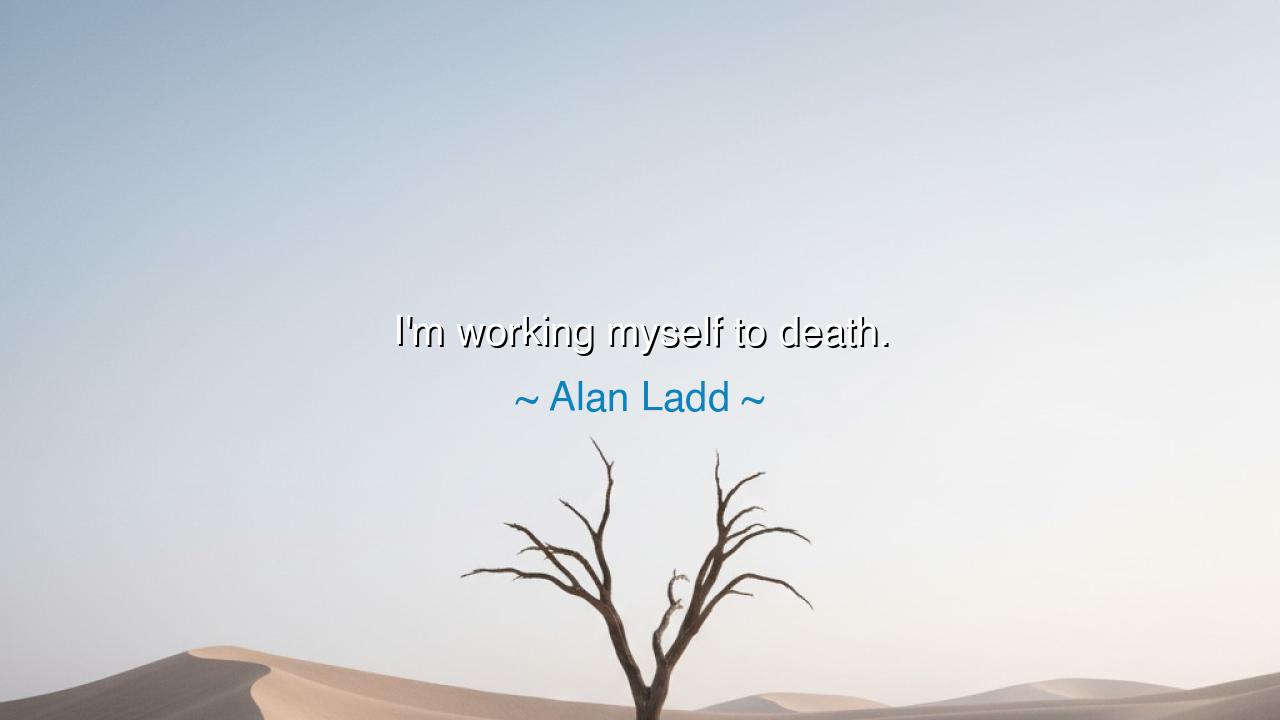
I'm working myself to death.






The words of Alan Ladd — “I’m working myself to death” — rise from the heart like a sigh of exhaustion, yet they echo with a tragic truth that reaches beyond one man’s life. They are not just the complaint of a weary actor, but the lament of a soul consumed by the relentless demands of the world. In this brief, sorrowful confession lies the fate of many who give everything to ambition, labor, and perfection — until their own fire burns them away. To work oneself to death is not merely to tire the body, but to forget the spirit that animates it. It is to serve the machine of life so endlessly that one forgets the meaning of living itself.
Alan Ladd, one of the great stars of Hollywood’s golden age, knew the cruel cost of success. Behind his striking presence on the screen — the quiet hero, the man of strength and stoicism — was a life of deep turmoil. The glittering lights of fame demanded from him not joy, but endurance. He lived in a world that adored his image but seldom saw his pain. Each role, each performance, each sleepless night was another stroke upon the anvil of his spirit. When he uttered those words — “I’m working myself to death” — it was not drama but prophecy. In 1964, at only fifty years old, his heart gave out, his body undone by exhaustion and despair. His life became a mirror of his warning — that to pour one’s soul endlessly into the pursuit of success without rest or reflection is to walk willingly toward the grave.
Throughout history, the same lament has been heard from countless souls. The builders of empires, the seekers of knowledge, the artisans of beauty — all have faced the same peril: the hunger to achieve without balance. Consider the tale of Vincent van Gogh, who painted the heavens in madness and brilliance, yet never knew peace. He worked not only with his hands but with his very life, burning through his days as a candle burns at both ends. His art immortalized him, but it also consumed him. The same fire that illuminated the world destroyed its bearer. This is the paradox of passion: it can uplift or undo, depending on whether we rule it or are ruled by it.
To work oneself to death is not always noble. There is no virtue in neglecting the soul for the sake of glory. The ancients knew this well. The philosopher Seneca warned that “to live is not merely to breathe, but to act with purpose.” Work, in its rightful place, is sacred — it shapes the world, feeds the hungry, fulfills destiny. But when work becomes the master, it devours its servant. When the striving for worth replaces the experience of being, life becomes a battlefield with no victory. The body weakens, the heart empties, and joy fades into duty.
Yet these words, tragic as they are, carry also a light — for they remind us to seek balance, to remember that rest is not idleness but renewal. The earth itself teaches this wisdom: even the mightiest trees sleep in winter, that they might bloom again in spring. The river flows swiftly but finds peace in its still pools. So too must we learn to pause — to breathe, to reflect, to simply exist. The soul needs silence as much as the body needs bread. When we forget this, we become like Ladd — outwardly shining, inwardly fading.
There is a lesson here for all who labor under the weight of expectation: do not confuse worth with work. The world may praise endless effort, but the divine honors harmony. Work diligently, yes, but let your work serve life, not consume it. When you feel the pull of exhaustion, heed it — it is your spirit crying for care. Sit beneath the open sky, speak gently to yourself, and remember that no dream is worth your destruction.
So, my children, take these words as both warning and wisdom. “I’m working myself to death” should never be the cry of a life half-lived. Let it awaken in you a gentler way — one where labor is guided by love, and rest is cherished as sacred. Build your dreams, but do not let them build your tomb. For the purpose of life is not merely to achieve, but to live — fully, deeply, peacefully. Work should be a fire that warms, not one that consumes. And when your hands are weary and your heart is full, may you lay down your tools not in defeat, but in quiet triumph — knowing you have served both your craft and your soul.






AAdministratorAdministrator
Welcome, honored guests. Please leave a comment, we will respond soon